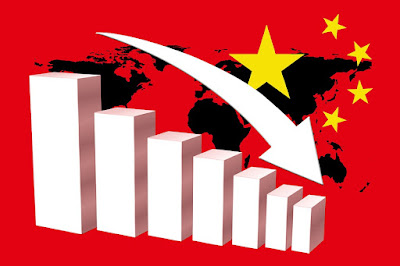Following the deep turmoil in global trade and trade protectionism, many countries - including the developed Western countries - experienced serious economic problems, pushing Germany - dubbed the "European economic locomotive" - into a trade deficit not seen since 1991.
In a report published by the Chinese newspaper "globaltimes", the newspaper's reporters say that China's trade surplus amounted to 78.76 billion dollars last May, and about 300 billion dollars in the first five months of this year, while analysts said that this discrepancy It not only reflects China's economic resilience, but also the US's dismal failure in disrupting the global trading system.
According to the newspaper, French customs said the deteriorating energy balance in the country had led to the trade deficit of French goods, which reached a new record level in May, by 13.1 billion euros ($13.34 billion).
According to Reuters, Japan experienced its largest trade deficit in 8 years last May, as rising commodity prices and a weaker yen swelled imports, distorting the country's economic outlook.
Reuters also said that the widening trade deficit highlights the headwinds faced by the world's third largest economy, from a weak yen and rising costs of fuel and raw materials that local manufacturers rely on for production.
trade deficit:
Experts pointed to the reasons for the widening trade deficit in many economies, including the Ukrainian crisis, which added problems to the already collapsing global supply chain, as well as the economic shock in many advanced economies in recent years.
"Except for China, many countries have taken a severe blow in supply chains and industrial chains and are still suffering from it," the newspaper quoted Bai Ming, deputy director of the Institute of International Market Research at the Chinese Academy of International Trade and Economic Cooperation, as saying, adding that this has caused Many countries face difficulties in producing or shipping their products abroad, which affects their share of exports.
Specifically, observers stressed the role of the Ukraine crisis in accelerating the trade deficit, as the cost of these imports has risen significantly for countries such as Germany or other European Union countries that rely heavily on basic Russian goods.
“Western sanctions against Russia would backfire on the EU by restricting its export channels and increasing the costs of raw materials and logistics, which is what reduces the efficiency of its industries.
Mi also said - according to the newspaper - that it is likely, in light of the war in Ukraine, that many traditional competitive industries in the European Union, such as automobiles and chemicals, will decline in global markets.
However, observers said that the phenomenon of trade deficits reflects the fundamental economic problems faced by those countries. Chen Jia, a researcher at the International Monetary Institute of Renmin University in China, told the Global Times on Sunday: "Japan's trade volatility is a symptom of the economic weakness of countries in the The post-coronavirus environment, with problems such as high inflation, currency devaluation, etc.
"The EU's reliance on cheap fossil energy in the past decades has not only caused its economy to recede in the face of global volatility, but has also largely lagged behind China and the United States in terms of new technical reforms, such as the implementation of new energy," Chen added.
Chinese growth:
Despite the growing headwinds of rising international commodity prices and sagging external demand amid rising inflation, China's trade expanded 82.3% year on year and grew 11.1 percent year on year in May, posting a trade surplus of $78.76 billion.
According to experts, the discrepancy between China and the trade status of many US allies reflects not only China's superiority in terms of economic resilience, but also the failure of the US strategy to reform the global trading system, especially with its focus on China's suppression and support for other regions.
"China's role as a global trading power and manufacturer is being strengthened, at a time when many of its competitors are affected by the turbulent global landscape and the emergence of signs of economic stagnation," Chen said.
But Bei warned that the economic weakness of European countries could increase pressure on China's trade as well, as European and American customers are the main buyers of Chinese goods.
Bai says, "China's trade pressure gradually declined in the first half of this year, while the performance in the second half depends on a number of factors such as competition with Southeast Asian economies and demands from European or American markets," but he added that controlling the situation in light of The presence of the Corona virus will ensure a stable business situation.
The newspaper concluded its report with what Mai said that the increasing trade deficit in other countries will enhance China's role as a factory in the world, but that the high prices of Chinese exports will provide opportunities for other countries to catch up with the benefits of these exports.


Comments
Post a Comment